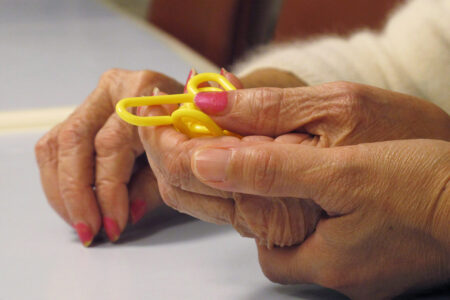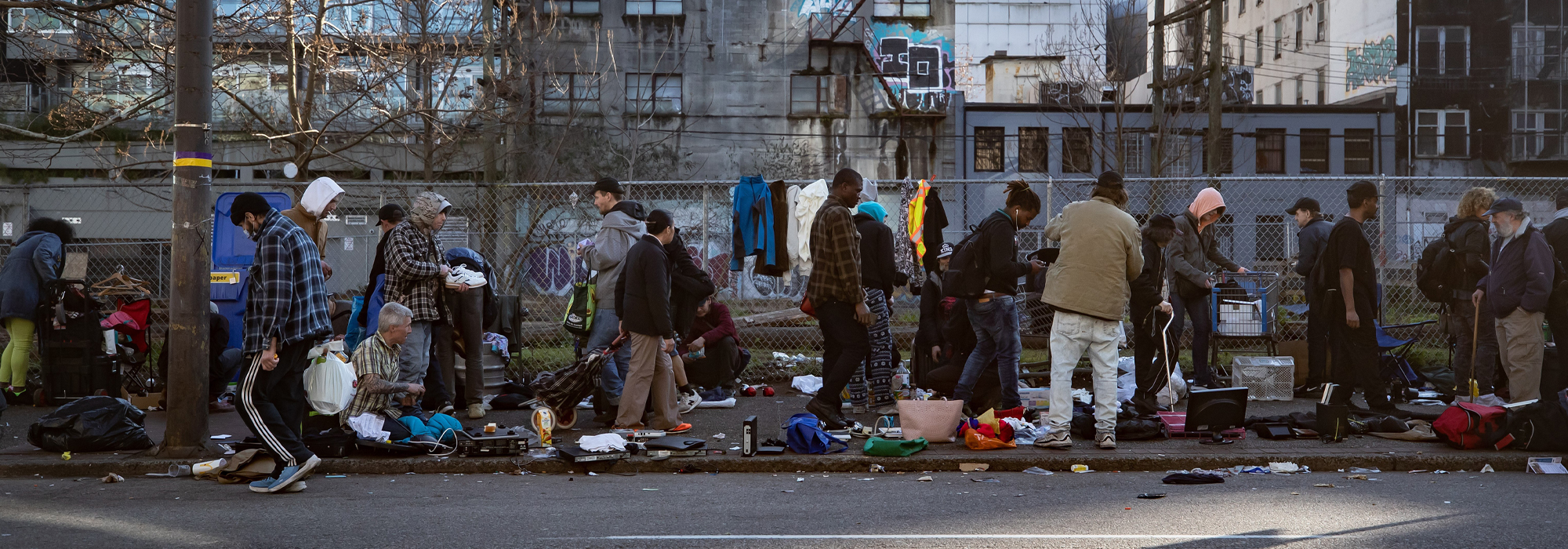
Footage of George Floyd’s killing by Minneapolis police officers sparked worldwide movements against institutionalized anti-Black racism and the brutal injustices routinely inflicted by police upon the poor, people in mental health crisis and people of colour. In Toronto, outrage at police involvement in the tragic death of a young Black woman, Regis Korchinski-Paquet, has mainstreamed bold calls to disarm and defund policing and decouple it from mental health and social services. Proposals to rethink the role and purpose of policing offer strong starting points for change, but in order to bring meaningful justice and peace to our communities, we must commit to much more. Without massive investment in social programs and the decommodification of basic human needs, the prospect of shedding our present dependence on punitive solutions to material deprivation and social exclusion is unimaginable.
Policing has extended into civic life to “protect” where governments have failed to serve. In my work — community mental health and addictions — the encroachment of policing and imprisonment in lieu of adequate social and economic supports couldn’t be more evident. The mishandling of deinstitutionalization — a historic process in which long-stay psychiatric institutions were replaced by community-based services — has been linked with the increased criminalization of people who are homeless and those who struggle with mental illness. In Toronto, the archaic Safe Streets Act imposes thousands of dollars in fines for “loitering” and panhandling even though shelters are full and people have nowhere to go. A 2016 John Howard Society study found that one in five men in provincial custody is homeless at the time of incarceration. It also found that, compared with the general population, inmates have dramatically worse health outcomes, experience higher suicide rates and are 58 times more likely to be admitted to a psychiatric facility shortly after release.
Many people I work with spend most of their adult lives trapped in a revolving door between shelters and prisons. In community mental health, our inability to scrape basic necessities together for our clients causes significant moral distress. So too does our reliance on police to respond to crises that could be avoided if people didn’t live under such heartbreaking conditions of gross neglect.
Concentrated and racialized poverty grows while affordable housing wait lists balloon, shelters burst at the seams, already inadequate funding for welfare and mental health programs stagnates and health care funding is slashed. We’re told the budgets are tight, yet funding for police services has been shielded from this same attrition.
Currently, Mobile Crisis Intervention Teams (MCITs) play a valuable role in addressing mental health crises when there is concern that someone risks causing serious harm to themselves or others. Co-staffed by mental health nurses and police officers, MCITs achieve better outcomes than police-only teams by cutting down involuntary emergency department visits, reducing contact with the corrections system, and lowering rates of arrest and injury. People generally report that these interactions are caring and respectful. Unfortunately, there are only six teams in all of Toronto so they aren’t always available when needed.
The reform proposals currently on offer are not rooted in robust evidence. Studies have shown that anti-bias training and body cams do virtually nothing to prevent brutalizing or deadly encounters with police. And while Canada is reluctant to disarm police forces, several OECD countries have never armed their police services, and people are much safer for it.
Meanwhile, public calls to remove police involvement from frontline mental health and overdose crisis response altogether have gained real traction. The suggestion to replace police teams with teams staffed by skilled mental health clinicians who are experienced in violence prevention, crisis de-escalation and mental health support is an undoubtedly sensible one. Still, in order to address the root causes of police violence and the harmful social and economic consequences of our unforgiving and highly retributive justice system, we have to look to the way we structure our social and economic systems.
Gregg Caruso, a philosopher of moral responsibility, draws inspiration for his work on transformative justice from a framework common in my field: the social determinants of health. He argues that this framework, which identifies social and economic conditions influencing group disparities in health status, is equally useful for considering how socio-economic inequality influences group disparities in violence and crime. For example, housing and access to health care often overlap as determinants of increased contact with the corrections system and victimization: people who are poor, homeless or struggling with mental illness are at increased risk of being victims of crimes as well as more likely to be arrested for certain crimes, such as disorderly conduct and property theft.
It’s not as though there is some congenital trait that can explain why certain groups of people are overrepresented in prisons. Rather, recent scholarship on mass incarceration has persuasively demonstrated that crime is better understood as an “index of oppression.” Blame resides less with individuals than with the broader forces that shape their life circumstances: the poverty-to-prison pipeline, underemployment, decades of welfare retrenchment, colonization and the ongoing effects of racist legislation and policy design. Marginalization can often force people into undesirable courses of action to survive. When we consider what even constitutes a punishable offence, financial sector bailouts offer further proof that it seems to be only those with lower incomes who are charged with crimes like “looting” or theft.
The COVID-19 pandemic is exposing gaping holes in our social safety net, and the movement to defund and disarm police further orients us to how we can remedy them. Underfunded and underresourced community members have long dedicated themselves to transformative justice and community safety with considerable success. Inspired by these models of nonviolent crisis intervention and conflict resolution, new programs have drawn additional methods from chronic disease management and public health approaches, to promising effect. Still, robust alternatives will require democratic participation, bold imagination and serious financial contributions from all levels of government.
I’m not the first to argue that meaningful change requires more than “police reform” or redirecting existing funds from police budgets to mental health services. But the fact that our safety and freedom are directly linked to the level of material deprivation and social inequality our society permits cannot be overemphasized. Tackling police violence, reducing inequality and decreasing crime will necessitate a redistribution of wealth and political power. This will undoubtedly be more expensive than policing and punishment alone, but we cannot rely on morally bankrupt cost-efficiency arguments to advance essential freedoms and human dignity. A truly just system of organizing public life is one that values life and guarantees everyone access to food, water, housing, child care, education and health care. Without any of this in place, we have little hope of healing the deep wounds wrought by economic injustice and racism.
Photo: People fill the sidewalk in the Downtown Eastside of Vancouver on March 21, 2020. THE CANADIAN PRESS/Darryl Dyck









